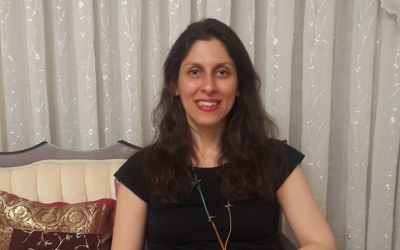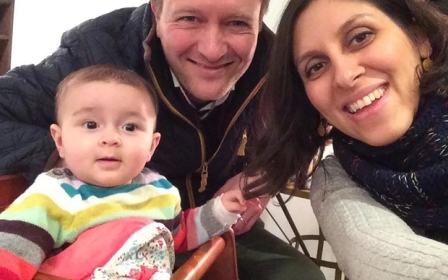Britain says Zaghari-Ratcliffe has 'no legal right to consular assistance'

The British Foreign Office has said that British-Iranian aid worker Nazanin Zaghari-Ratcliffe has no right to its help, appearing to row back on the diplomatic cover it had provided her last year.
The claim, contained in a letter sent to lawyers representing Zaghari-Ratcliffe, could have profound implications for all Britons travelling abroad in the belief that their passport grants them the legal right to government help, prompting consternation from politicians and constitutional observers.
Zaghari-Ratcliffe's family MP, Tulip Siddiq, said that Britain was "failing" in its basic duty to protect its citizens.
Zaghari-Ratcliffe, an aid worker, is serving a five-year sentence in Iran for espionage, a charge she has consistently denied.
She was arrested in 2016 as she was leaving Iran after taking her then 22-month-old daughter to visit family. The 42-year-old was moved from prison to house arrest in March, due to coronavirus precautions.
New MEE newsletter: Jerusalem Dispatch
Sign up to get the latest insights and analysis on Israel-Palestine, alongside Turkey Unpacked and other MEE newsletters
Coming under pressure from politicians and Zaghari-Ratcliffe's family, in a rare move last year the British government granted her diplomatic protection in an attempt to push Iran to release her.
It upgraded the dispute to a formal legal issue between countries, allowing Britain to raise Zaghari-Ratcliffe's case more easily at international forums such as the United Nations.
But in a letter sent to lawyers acting on behalf of Zaghari-Ratcliffe, Sarah Broughton, the head of consular affairs at the Foreign Office, wrote that the decision to invoke diplomatic protection "does not confer any specific legal obligations upon us".
British citizens wrongly detained overseas have "no legal right to consular assistance," Boughton wrote in the letter, obtained by The Times.
In response, the family's lawyers wrote: "If it is really the government's position that it has no obligations even in the extreme and unique circumstances of Nazanin's case, then that sends an extremely alarming message to the rest of the British public."
'Plainly failed to engage'
Since Zaghari-Ratcliffe's arrest in April 2016, British officials have not visited her, despite reports of her mistreatment.
British officials have argued that Iran has not granted its request for consular access to visit Zaghari-Ratcliffe, who is a dual British-Iran national, a status Iran does not recognise.
Her lawyers disagree, however, and in August wrote to UK Defence Secretary Ben Wallace, saying that the British had "plainly failed to engage in constructive dialogue with Tehran" for fear of upsetting US President Donald Trump.
Lawyers further claimed that British inaction was down to its failure to settle a $400m debt that relates to an arms deal with the late Shah of Iran. The government has refused to publicly acknowledge a connection between Zaghari-Ratcliffe's continued detention and the debt, which is the subject of protracted legal wrangling.
Jack Straw, who was foreign secretary under Tony Blair, told The Times: "The difficulty for the British government is that without a scintilla of doubt we owe them this money."
Siddiq, the Ratcliffe family's MP, told the same paper that the government was failing "at its most basic duty: to protect its citizens". She said: "If our new blue passports don't mean that, what are they going to mean?" referring to the new Post-Brexit passports.
Middle East Eye delivers independent and unrivalled coverage and analysis of the Middle East, North Africa and beyond. To learn more about republishing this content and the associated fees, please fill out this form. More about MEE can be found here.




